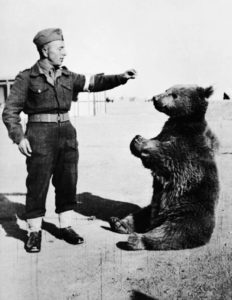
Iran welcomed thousands of Polish refugees during World War II from 1942 to 1945. It’s estimated that more than 116,000 refugees reached Iran after their long odyssey from detention and resettlement camps in frozen Siberia. Most were women and children. The country also served as an assembly point for British and Polish forces before the brutal Battle for Monte Cassino (Italy) in 1944. At first, Iran declared neutrality, and then in September 1943, Iran declared war on Germany.
The history of Iran and both its generosity to refugees and its other privations during World War II is complex. Ditto for the sufferings of the Polish people because of Joseph Stalin’s policies and actions after he invaded Poland on September 17, 1939. I post this story as a reminder that history happens one person at a time, and alliances change through the centuries. Whatever new headlines are today, there is always another story.
Why Iran? Blame Joseph Stalin.
In 1940 Joseph Stalin deported two million Poles to Siberian detention or resettlement camps
Joseph Stalin deported one to two million Poles from Eastern Poland in the winter of 1940 and sent them to camps, or settlements in the frozen tundra of Russia. The Russians evicted the Poles with little notice. They had little time to pack a few belongings and leave their homes, never to return. From there, they spent up to three weeks on cold, unheated trains. Most of those deported were women and children. Many of the men were deported previously to labor camps, and prisons, or were executed by the Russians. Imagine not knowing if your other family members were still alive (spouses and children) for the entire war. Neither knew if the other was alive. Only a third survived; none had homes to return to.
Another contingent of Poles had moved to Russia to escape the German invasion of Poland.
In June 1941, Germany attacked Russia in Operation Barbarossa. Millions of Russian soldiers battled the Germans. In need of more troops, the Russians closed most camps and saw Polish soldiers as soldiers who could fight with Russia and the Allies against the Germans. Polish refugees were released to make their way someplace. The Russians gave them little food or supplies. They headed south to warmth, walking hundreds of wretched miles as they scrounged for survival. Thousands died along the way.
Tehran became the gateway for thousands of refugees

The history of Iran-Polish relations dates long before World War II. When Poland regained its independence in 1918, Iran recognized Polish independence, and both established diplomatic relations.
More than 116,000 Polish refugees made their way to Tehran, including 5,000 to 6,000 Jews. The refugee camps sprang up to accommodate the massive number of people in need of shelter, medical care, and a huge number of orphans. One was located in the Shah’s gardens. One account reports twenty temporary camps in Tehran housing thousands of orphaned children. (Another account reports four.) Many survivors remember the warm reception they received from the Iranian population. Polish schools, cultural and educational organizations, shops, bakeries, businesses, and the press were established to make the Poles feel more at home.
From Tehran, refugees were sent to displaced persons camps in India, Africa, Mexico, Palestine, and New Zealand where many spent several years in these camps.
Sadly, many were laid to rest there, not able to recover from harsh conditions. The Doulab Catholic Cemetery in Tehran is historical in the eastern suburbs of Tehran, Iran. This cemetery contains the graves of nearly 2,000 Poles, including 50-60 Polish Jews. This cemetery is a poignant reminder of the historical connections between Poland and Iran during a tumultuous period of global conflict. Even TripAdvisor lists the Polish cemetery as a point of interest.
Wojtek the Bear and an Iranian diplomat
Two more stories of Iran during World War II include an orphaned bear cub and a Muslim diplomat who saved up to 2,000 Iranian Jews.
 In 1942, a young Iranian boy gave an adopted bear cub to the Polish army stationed in Iran. As Wojtek (pronounced VOY-tek) grew he was unafraid of humans and became the unofficial mascot for soldiers in nearby units. The bear lived with other soldiers in their tents and traveled by ship with the rest of the army in a large crate. During the 1944 battle of Monte Cassino (Italy) the furry Private Wojtek proved his worth as a soldier by carrying live ammunition for the troops.
In 1942, a young Iranian boy gave an adopted bear cub to the Polish army stationed in Iran. As Wojtek (pronounced VOY-tek) grew he was unafraid of humans and became the unofficial mascot for soldiers in nearby units. The bear lived with other soldiers in their tents and traveled by ship with the rest of the army in a large crate. During the 1944 battle of Monte Cassino (Italy) the furry Private Wojtek proved his worth as a soldier by carrying live ammunition for the troops.
I wrote about Wojtek the Bear in a 2015 blog post. Click here to read. In the last ten years, memorials, books, and even a movie have been dedicated to the memory of Wojtek.
Additionally, during World War II, Abdol Hossein Sardari, a Muslim Iranian diplomat, used his position as a diplomat in Paris to save up to 2,000 Iranian Jews living in France from the Nazis and certain death. This story also appeared in a 2015 blog post. Click here to read.
History happens one person, and in this case, one bear at a time.
More stories on Poles in Iran
A fabulous online resource on the topic is the Kresy Siberia Virtual Museum.
USHMM, Polish Refugees in Iran during World War II, Click here.
Previous blog posts of memoirs of Polish refugees include:
Author Profile: Greg Archer, Author of Grace Revealed, a Memoir. Click here.
Book Review – One Star Away by Imogene Salva. Click here.
Book Review: My Sister’s Mother: A Memoir of War, Exile, and Stalin’s Siberia by Donna Urbikas. Click here.
In friendship,


4 Comments. Leave new
Always learning . Thank you for all the information. Muslim / catholic we are people and should try to do best to get along.
Thanks for reading!
Katrina, this is a well-written testament of facts that happened to my mother and her family in WWII Poland after the Molotov-Ribbentrop signed on Aug 23, 1939. Russia invaded Poland on September 17, 1939.
My grandmother, her children, who all survived the Siberian Gulag, were grateful to those who contributed to their survival. My grandfather was killed on his farm by the Russians.
From the Siberian Gulag, after Operation Barbarossa, the prisoners released walked from Siberia through the Urals to Kazakhstan, the natives hostile, as thousands of prisoners, including Children who were starving and walking south, were seeking help. From there, they walked to Iran. From Iran, they walked to India to refugee camps funded by the Polish Red Cross in Bombay, where many suffered from not only Malaria but also from trachoma due to infected, dirty water. My family, after India, they were sent to Leon, Mexico, 1943-1945, where they worked as farmers and kitchen help, funded by the Polish-British-American Committee. They spoke both Spanish and English, as taught by the nuns in Leon, to legally migrate to the United States to an orphanage in Chicago.
In Honor of my family, I am donating the Leather Polish School in Mexico yearbook to the Polish Museum in Chicago this month. I am grateful to all the nations that welcomed the Polish refugees after their land was stolen and their lives displaced by Stalin and Hitler.
Thank you for your well-thought out comment. I hope that I can one day visit the Polish Museum in Chicago and look at your family’s yearbook. Best wishes,